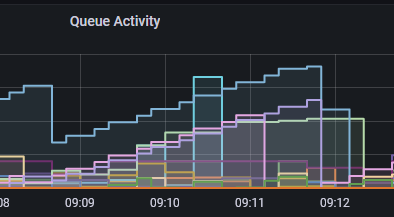I saw this article a couple of days ago about the end-of-life for HP-UX. While MQ has not produced a new version for that operating system for a number of years (the last release was 9.0, around 2017), it’s still a bit sad to see.
Continue reading “End of a platform”MQ Monitoring: using queue manager STATISTICS events
The sample monitoring packages here use a variety of techniques to collect metrics from the queue manager. The most recent release (v5.7.0) adds a further alternative approach.
Continue reading “MQ Monitoring: using queue manager STATISTICS events”MQ with Spring Boot 4
The first pre-release version of Spring Boot 4 (milestone 1) has just been published. What does it mean for MQ’s support of the Spring Boot environment?
Continue reading “MQ with Spring Boot 4”Enabling Testcontainers for testing MQ Spring applications
UPDATE 2025/06/19: This project has now been released properly to Maven Central.
UPDATE 2025/07/29: The IBM MQ module now appears in the Testcontainers catalog
I have just published a “Tech Preview” of some components needed to simplify testing of Spring Boot applications that use MQ. It uses the Testcontainers framework that many may have heard of, and is intended to make it easy to build temporary resources such as queue managers as part of the test cycle
If you’re interested in looking further, see here. Please leave any comments as issues on the GitHub repository.
This preview is build-it-yourself for now, with the aim being to get feedback before finalising the overall shape and publishing new jars to Maven. It’s also not on the main branch of the ibm-messaging/mq-jms-spring repository, just to keep that clean for now.
Article also published here.
AIX compiler support for MQ
One person asking a question will get an answer; two people asking the same question will probably prompt a post. So here’s the latest: MQ listed the XLC/C++ 16 compiler for AIX as deprecated in 2024 and support for it was removed in version 9.4.2. What does that mean for new development or existing applications?
Continue reading “AIX compiler support for MQ”MQ Spring Boot Starter: More on global transactions
A previous article described some new sample programs showing the use of the MQ Spring Boot starter with transactions. There is a further similar sample now available, using a different transaction manager: Narayana.
Continue reading “MQ Spring Boot Starter: More on global transactions”Native HA CRR metrics & mqperfck
There will, no doubt, be full discussions elsewhere of the new MQ Native HA Cross-region Replication feature. But one aspect of it seemed particularly relevant to other articles on this site: monitoring the CRR metrics.
The MQ 9.4.2 release also includes another tool, mqperfck, that introduces some additional metrics. And I’ll talk about how that potentially affects other monitoring tools.
MQ PCF value formatting
In MQ V8, a new header file made it easy for C programs to convert MQI numbers into the corresponding string definition. For example, turning 2035 into MQRC_NOT_AUTHORIZED. For formatting PCF-based messages such as events, you can easily convert the names of fields in those events using functions like MQIA_STR or MQCACH_STR. But what about turning the values in those elements into a string? There is a new tool in the MQ Go library to help with MQ PCF value formatting. And it is easy to adopt or port it for other languages too.
New C sample programs
The mq-dev-patterns repository contains a collection of sample programs for IBM MQ. It has examples in a variety of programming languages and styles, working in a number of environments. There are programs showing use of the MQI (or equivalent), JMS, AMQP and REST interfaces. Towards the end of last year, we added a set of C sample programs. Rich wrote a little about them here, but I thought I’d expand on why they were written, and how they work.
Continue reading “New C sample programs”OTel Context Propagation for MQ Applications: part 3 – JMS
Previous articles in this series have shown OpenTelemetry (OTel) Context propagation for Node.js, Go and C/C++ MQ applications. You should read the first article for an introduction and explanation of the scenarios and problems that need solutions.
This (final?) entry discusses JMS applications.
Continue reading “OTel Context Propagation for MQ Applications: part 3 – JMS”


